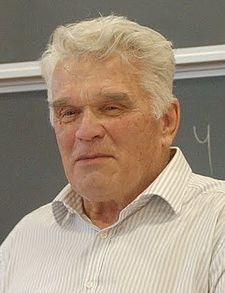Ludvig Faddeev
| Ludvig Faddeev | |
|---|---|

Ludvig Faddeev during a talk at Aarhus University, August 2010
|
|
| Born |
March 23, 1934 Leningrad, Soviet Union |
| Died | 26 February 2017 (aged 82) |
| Nationality | Russian |
| Fields | Mathematics, theoretical physics |
| Institutions | Steklov Institute of Mathematics |
| Alma mater | Saint Petersburg State University |
| Doctoral advisor | Olga Ladyzhenskaya |
| Doctoral students |
Vladimir Buslaev Petr Kulish Nicolai Reshetikhin Samson Shatashvili Leon Takhtajan Vladimir Korepin Alexander Its |
| Known for |
Faddeev–Popov ghosts Faddeev equations Faddeev–Senjanovic quantization Faddeev–Jackiw quantization |
| Notable awards | Dannie Heineman Prize (1975) Dirac Prize (1990) Max Planck Medal (1996) Pomeranchuk Prize (2002) Demidov Prize (2002) Poincaré Prize (2006) Shaw Prize (2008) Lomonosov Gold Medal (2013) |
Ludvig Dmitrievich Faddeev (also Ludwig Dmitriyevich; Russian: Лю́двиг Дми́триевич Фадде́ев; 23 March 1934 – 26 February 2017) was a Soviet and Russian theoretical physicist and mathematician. He is known for the discovery of the Faddeev equations in the theory of the quantum mechanical three-body problem and for the development of path integral methods in the quantization of non-abelian gauge field theories, including the introduction (with Victor Popov) of Faddeev–Popov ghosts. He led the Leningrad School, in which he along with many of his students developed the quantum inverse scattering method for studying quantum integrable systems in one space and one time dimension. This work led to the invention of quantum groups by Drinfeld and Jimbo.
Faddeev was born in Leningrad to a family of mathematicians. His father, Dmitry Faddeev, was a well known algebraist, professor of Leningrad University and member of the Russian Academy of Sciences. His mother, Vera Faddeeva, was known for her work in numerical linear algebra. Faddeev attended Leningrad University, receiving his undergraduate degree in 1956. He enrolled in physics, rather than mathematics, "to be independent of [his] father". Nevertheless, he received a solid education in mathematics as well "due to the influence of V. A. Fock and V. I. Smirnov". His doctoral work, on scattering theory, was completed in 1959 under the direction of Olga Ladyzhenskaya.
...
Wikipedia
